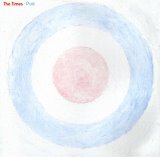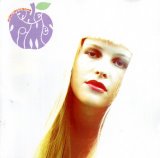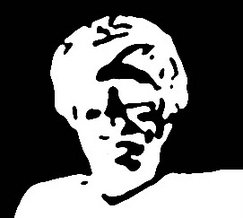Jukebox Juicebox #20 - Go! With The Times
 The Times “Pure” (1991)
The Times “Pure” (1991)Listening to radio station Triple J in Perth, Western Australia in 1990 was my only link to the burgeoning UK indie-dance crossover. I can remember being blown away one evening by a ten-minute cover version of New Order’s Blue Monday, sung in French, with extracts from John Lydon and (what I thought was) Sinead O’Connor seamlessly woven in. On returning to England several months later, I managed to get my hands on a vinyl copy of Pure and so began my fascination with The Times, and more specifically, the world of Edward Ball. The twin sides of vinyl were labelled Brown Ball and Pink Ball. Although this is the case with my recent CD replacement copy, the album has been segued into a single, 40 minute track. Whilst annoying for those who feel an obsessive need to program and skip tracks, Pure makes much more sense as a continuous piece. The album opener, From Chelsea Green To Brighton Beach is a rousing mix of football terrace chants, Quadrophenia samples and pastiche of The Jam before taking a sharp right turn into the psychedelia of A Girl Called Mersey (apparently a tribute to Pete Wylie’s daughter). Just when you think you’ve pegged the album, it takes another turn, this time laying samples from A Clockwork Orange over a dub-inflected interlude, before launching into the aforementioned Blue Monday, here retitled Lundi Bleu. The song opens with a sampled monlogue on the nature of conceptual reality, before a rumbling, locomotive bassline and Paul Heeren’s squalling lead guitar propel the song towards Edward Ball’s endearingly awkward French vocals. The song encapsulates the album’s spirit of experimentation, with the aforementioned Lydon rant from the middle section of Public Image Limited’s Religion I and 1970s folkies Prelude’s haunting rendition of Neil Young’s After The Goldrush creating an epic of gargantuan proportions. All cover versions should be this radical. Compared to Brown Ball / 'side one', the three tracks comprising Pink Ball are a stark contrast, opening and closing with kitsch 1960s radio show idents. Stylistically inspired by Ball’s dance offshoot, Love Corporation, A Beautiful Village Called England features cod-rapper Angel Dust (aka Cindy Lovecore) toasting DJ Mr. Wolf, who chops and changes the beats per minute with alarming regularity. Ours Is A Wonderlove World is a downtempo tale of a doomed existence, with vocalist Catherine Wheel’s deliberately emotionless recitation echoed by Ball’s more melodic delivery of the same lyrics, as the song leads to the strangely depressing climatic refrain of “God is love”. Angel Dust returns for more stream of consciousness ramblings over a bouncing beat that at times bizarrely mimics Pink Floyd’s Money. An untitled epilogue includes a female sample that sums up Pure perfectly: “Is it art or anti art? Dadaeqsque compositions on vinyl…or is it quite simply just pop?” Quite simply one of the best albums of the early 1990s.
Tracklisting: 1. From Chelsea Green To Brighton Beach / 2. A Girl Called Mersey / 3. From L.A. To Edgbaston / 4. Lundi Bleu / 5. A Beautiful Village Called England / 6. Ours Is A Wonderlove World / 7. Another Star In Heaven / 8. untitled reprise
 The Times “Et Dieu Créa La Femme” (1990)
The Times “Et Dieu Créa La Femme” (1990)The blistering Septième Ciel, with it’s opening salvo of “Pop’s coming! / Don’t stop the party!”, is an infectious celebration of the dance culture spreading the UK at the time. Sampling The Smiths’ How Soon Is Now? (which contemporaneously appeared on Sinead O’ Connor’s I Am Stretched On Your Grave and Soho’s Hippychick), Septième Ciel – and accompanying track Aurore Borealé - continues the fascination with the ecstasy-fuelled tunes suggested by 1989’s E For Edward. Not that the album is solely focused on dancefloor hedonism. As the title suggests, Et Dieu Créa La Femme is equally concerned with old fashioned love. Edward Ball’s penchant for heartfelt lyrics come to the fore on the piano driven Confiance and Chagrin D’Amour, as well as the more uptempo tribute Pour Kylie. There are also moments of acid-tinged pop-rock in Volupté and Baisers Volés, whilst 1990 Année Erotique updates Serge Gainsbourg’s Je T’ Aime. A pair of unlisted and untitled bonus tracks bolster the CD release. The first is a version of The Times’ 1983 classic I Helped Patrick McGoohan Escape. My guess is that it’s the Thanks For The Trip Dad! remix by (yet another) side project DJ 6 & the Escape Committee from the 1990 Creation compilation Pensioners On Ecstasy. It’s an energetic floor-filler that perhaps deserved more commercial success than the proliferation of dance tracks inspired by The Prisoner theme tune that decade, but doesn’t really fit in with the album as a whole. Likewise, the dizzingly paced final track samples a naggingly familiar 1970s track, the name of which will come back to me long after I’ve posted this review. Good as of itself, but again an unnecessary add-on to an otherwise seamless album. My advice: rip the bonus tracks onto a compilation, load the album proper onto your portable player and transport yourself back to the heady days of the 1990s. The aural equivalent of feeling flowered up.
Tracklisting: 1. Septième Ciel / 2. Aurore Boréale / 3. Confiance / 4. Chagrin D’Amour / 5. Volupté / 6. Baisers Volés / 7. Pour Kylie / 8. Sucette / 9. 1990 Année Erotique / 10. Extase / 11. untitled [I Helped Patrick McGoohan Escape (Thanks For The Trip Dad!)] / 12. untitled



0 Comments:
Post a Comment
<< Home